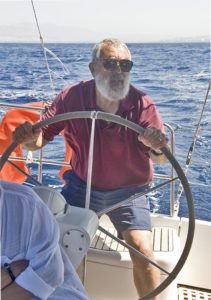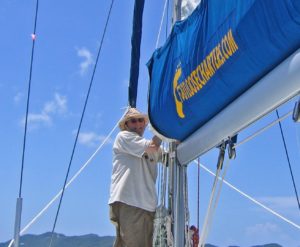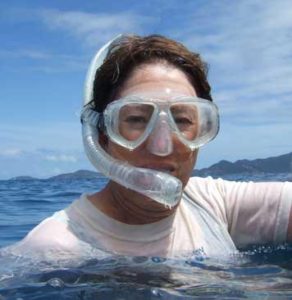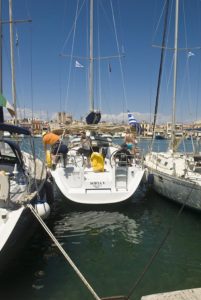Sailing
Even though I’ve known him for fifty years, I don’t really know what Allen looks like. His features are hidden by a full beard. If he cut it off, I wouldn’t recognize him. Looking much like Fidel Castro, a little bit more muscular, with a close cropped head of grey tinged hair, he distinguished himself as an undergraduate at the University of Chicago, a graduate student at Cal Tech, and as a postdoc at Yale.  He was hired at Hopkins a year after I joined the faculty. We both worked with fruit flies and occupied neighboring laboratories. After I left Hopkins, Allen became department chairman, a position previously occupied by some of the worlds accomplished biologists. He also took up sailing, and, because he does nearly everything he tries well, he became good enough to be a sailing instructor, offering lessons in Baltimore Harbor. Some time later, after retiring to Canada, he and Peggy purchased a boat and joined a sailing club. They spend a good part of the summer on the water.
He was hired at Hopkins a year after I joined the faculty. We both worked with fruit flies and occupied neighboring laboratories. After I left Hopkins, Allen became department chairman, a position previously occupied by some of the worlds accomplished biologists. He also took up sailing, and, because he does nearly everything he tries well, he became good enough to be a sailing instructor, offering lessons in Baltimore Harbor. Some time later, after retiring to Canada, he and Peggy purchased a boat and joined a sailing club. They spend a good part of the summer on the water.
 He was hired at Hopkins a year after I joined the faculty. We both worked with fruit flies and occupied neighboring laboratories. After I left Hopkins, Allen became department chairman, a position previously occupied by some of the worlds accomplished biologists. He also took up sailing, and, because he does nearly everything he tries well, he became good enough to be a sailing instructor, offering lessons in Baltimore Harbor. Some time later, after retiring to Canada, he and Peggy purchased a boat and joined a sailing club. They spend a good part of the summer on the water.
He was hired at Hopkins a year after I joined the faculty. We both worked with fruit flies and occupied neighboring laboratories. After I left Hopkins, Allen became department chairman, a position previously occupied by some of the worlds accomplished biologists. He also took up sailing, and, because he does nearly everything he tries well, he became good enough to be a sailing instructor, offering lessons in Baltimore Harbor. Some time later, after retiring to Canada, he and Peggy purchased a boat and joined a sailing club. They spend a good part of the summer on the water.My other long time friend is Kirby. I first met him when I arrived at Hopkins as a postdoctoral fellow in 1967. Tall and thin with an athletic build that reflected his years as a world class middle distance runner in California, Kirby was a student of Professor Ursprung at Hopkins. upon earning his doctorate he had gone off to Seattle to learn about the mysterious ways of DNA. After returning to Hopkins, he spent several years on the faculty at the Homewood Campus. They were followed by a move over to the Hopkins Medical School in pursuit of some more clinically related issues. Kirby, like Allen, was a sailor, having owned a small boat that he would take out into Chesapeake Bay.

Unlike my two friends, I wasn’t a sailor and had never been exposed to the activity. It didn’t look like fun and was clearly expensive. From afar, sailing seemed like standing in a cold shower throwing twenty dollar bills down the drain. Kirby must have finally reached the same conclusion. He sold his boat to a graduate student who had not yet learned the vicissitudes of the sea.

Unlike my two friends, I wasn’t a sailor and had never been exposed to the activity. It didn’t look like fun and was clearly expensive. From afar, sailing seemed like standing in a cold shower throwing twenty dollar bills down the drain. Kirby must have finally reached the same conclusion. He sold his boat to a graduate student who had not yet learned the vicissitudes of the sea.
In all, Gail and I have known Allen and Kirby, and their wives – Peggy and Linda – for more than 50 years. We make up a six-some that once or twice a year go off together on some adventure. In 2006, having recently become aware that Allen was a sailing instructor, I suggested, despite my lack of enthusiasm for the water, that we undertake a bare boat rental in the British Virgin Islands. We all agreed with the following conditions: the wives would just be passengers. They wouldn’t do any of the required chores except some light cooking (the idea was to dine ashore). In addition, Kirby, given his previous experience, would be the first mate. Finally, I, with no expertise, prone to sea sickness, and whose idea this was in the first place, would be the trailer in the batting order, delegated to doing anything and everything that nobody else cared to do. I was the “last mate”.
If it isn’t already clear, a bare boat rental means that the rental agency doesn’t supply any help once we left the dock. On our own, we were to captain, crew, navigate, and cook. We were given a briefing, purchased the needed supplies, clambered aboard, and disembarked.
If it isn’t already clear, a bare boat rental means that the rental agency doesn’t supply any help once we left the dock. On our own, we were to captain, crew, navigate, and cook. We were given a briefing, purchased the needed supplies, clambered aboard, and disembarked.
 There were many opportunities for problems, but the trip turned out to be magical. The British Virgin Islands are the perfect arena for novice sailors. The wind is gentle and steady, and almost always blowing in the same direction; one never loses sight of land going from one island to another, so navigation is a snap; the water is warm and the reefs beautiful; and, when the sailing ends for the day, there are ample places to tie up to a floating mooring buoy, take a dinghy to some restaurant or bar, and spend happy hours laughing and sharing remembrances. This last activity was augmented by the fact that we discovered two classic Virgin Island drinks: “painkillers” and “bushwhackers”. Ordinarily, I’m not much for booze, restricting my alcohol intake to wines and an occasional after dinner drink, but these two went down very easily.
There were many opportunities for problems, but the trip turned out to be magical. The British Virgin Islands are the perfect arena for novice sailors. The wind is gentle and steady, and almost always blowing in the same direction; one never loses sight of land going from one island to another, so navigation is a snap; the water is warm and the reefs beautiful; and, when the sailing ends for the day, there are ample places to tie up to a floating mooring buoy, take a dinghy to some restaurant or bar, and spend happy hours laughing and sharing remembrances. This last activity was augmented by the fact that we discovered two classic Virgin Island drinks: “painkillers” and “bushwhackers”. Ordinarily, I’m not much for booze, restricting my alcohol intake to wines and an occasional after dinner drink, but these two went down very easily.“We had such a good time, we should do it again”, I suggested one cold winter evening. “There’s a couple of islands that we missed, and perhaps some new drinks to be discovered.” Allen demurred. He wanted a more adventurous experience. “Let’s go to Greece”.
And so, the next year we found ourselves on a dock getting a briefing on how to handle the “Escapar”, a 45 footer out of Athens. Soon we were out on the Adriatic, sailing from one exotic island to another, sampling the incredibly fresh Greek food, and meeting other adventurers. However, this time the voyage wasn’t quite carefree. The problem was parking, or, as those of us in the boating business call it, docking.
 In the British Virgin’s, we would tie up each evening to a floating buoy, a yellow sphere attached to the bottom by a chain. There would be a pick-up line attached to the ball, and we would grab it with a boat hook and attach ourselves to it with a rope from our boat. Occasionally, there would be problem locating the pick-up rope, and one of us would have to dive into the water to find it. Since I was the last mate, this was my job. I didn’t mind. The water was warm and clean, and it was a chance to get refreshed.
In the British Virgin’s, we would tie up each evening to a floating buoy, a yellow sphere attached to the bottom by a chain. There would be a pick-up line attached to the ball, and we would grab it with a boat hook and attach ourselves to it with a rope from our boat. Occasionally, there would be problem locating the pick-up rope, and one of us would have to dive into the water to find it. Since I was the last mate, this was my job. I didn’t mind. The water was warm and clean, and it was a chance to get refreshed.Mooring in the Mediterranean/Adriatic, in fact all across Europe, is quite different. Here’s how the procedure is done. First a parking place has to be located. As in car parking, this can be a challenge since the docks are invariably crowded. Boats are often lined up side to side with only a few inches to spare. Second, the crew has to deploy fenders on all vulnerable surfaces. If something goes amiss, and and one vessel bumps another, angry words and sometimes more can be exchanged. Third, the captain has to position his charge about three or four ship lengths from shore, exactly perpendicular to it, with the stern oriented toward the dock. When in precisely the right position, he then must issue the order to drop anchor, and one of the crew (me) should promptly carry out the command. Fourth, as the anchor hits bottom, the captain puts on a brief burst of reverse speed to set it. He then slowly continues to back up the boat toward the space on the dock, making his way in-between vessels already tied up, taking note of the wind and current, both of which would be acting to stymie his efforts. Fifth, when the boat is within a few feet of the dock, one of the crew (me) should throw a line to someone on the shore who would tie us up to a convenient solid object. If there isn’t anyone to help, someone on the boat has to leap from the boat to the dock. This last task was seldom necessary because we invariably found a friendly sailor on shore to lend a hand.
Allen and the crew got to be pretty good at this complicated dance. However, the reverse step could be equally nerve wracking. You have to picture a dozen or more sailing ships of various sizes lined up along a dock, each one wedged between two neighbors. Every one of these boats had put out an anchor perpendicular to the shore line as part of the procedure previously described. You would think that undocking would only consist of untying the shore line, motoring out to the position where the anchor was placed while slowly pulling it aboard, retrieving the anchor and going on one’s way. The problem is with the word “perpendicular”. It’s a mathematical term with a precise definition. However, despite every sailor’s best efforts, some of the lines are not oriented strictly 90 degrees with respect to the dock. That meant that sometimes the lines of two or more adjoining boats would cross. The consequences of this would be that sometimes, when an anchor is raised, someone else’s would come up too. The tangle that ensues might be easily resolved or not (or ‘knot’). There were some heated exchanges challenging the seamanship of some of the sailors, even sometimes their birthrights.
While docking and undocking were sometimes nerve-wracking, always tense, we hadn’t run into too many issues until we arrived at Poros, an island in the Saronic Sea. We motored around for a while, passing crowded quays, not finding a place to park our vessel. Finally, our hunger increasing and our patience ebbing, we located what seemed to be a suitable spot. It wasn’t quite like the others, but there wasn’t a sign that indicated that we couldn’t settle there. The wind was up, but Allen maneuvered Escaper expertly into position. However, as we moved forward and dropped the anchor, some one on shore began shouting at us. Apparently he was telling us that we hadn’t found an appropriate parking place. No problem. We began to lift the anchor so that we could leave. Unfortunately, we found that we were stuck. We remained motionless for several minutes, unable to move away from the shore. Our crew conferred. What was holding us in place? Using our combined scientific expertise, we concluded that somehow we had hooked on to someone’s anchor and thus were prevented from moving. We conferred again. What to do? A decision was quickly arrived at: One of us had to jump in the water with snorkeling gear and fins, swim under the boat, and see what the problem was. If indeed we were hooked by an anchor, that someone had to unhook us. We conferred one last time. Who was to do the deed? We couldn’t ask one of the women. They were promised that we would handle these kind of emergencies. That left Allen, Kirby, or me. It was decided by a vote of two to one that this was the job of the last mate.
 I jumped into the water with my gear on. I was frightened, fearing that I would have to dive under the boat and hit my head on the way up or get tangled in one of the many ropes in the harbor. But the water was warm and clear, and soon I could make out, some ten or twelve feet below the surface, that there actually was something hooked to our anchor line, firmly fixing us in place. I dove down and easily freed the ancient rusted anchor, which appeared to have been manufactured in the middle ages, from its position and returned to the surface. I signaled a thumbs up, clamored aboard, and we were on our way. However, as we slowly motored off we saw that same individual who had shouted at us earlier, this time wildly gesticulating. He was shouting something in Greek – at least it was Greek to us – and running back and forth, clearly disturbed. As me moved parallel to the shoreline, searching for another site to dock, he followed, yelling all the time.
I jumped into the water with my gear on. I was frightened, fearing that I would have to dive under the boat and hit my head on the way up or get tangled in one of the many ropes in the harbor. But the water was warm and clear, and soon I could make out, some ten or twelve feet below the surface, that there actually was something hooked to our anchor line, firmly fixing us in place. I dove down and easily freed the ancient rusted anchor, which appeared to have been manufactured in the middle ages, from its position and returned to the surface. I signaled a thumbs up, clamored aboard, and we were on our way. However, as we slowly motored off we saw that same individual who had shouted at us earlier, this time wildly gesticulating. He was shouting something in Greek – at least it was Greek to us – and running back and forth, clearly disturbed. As me moved parallel to the shoreline, searching for another site to dock, he followed, yelling all the time.
When we finally found an empty parking spot, the fisherman, for that was what he was, was there to meet us, accompanied by two armed members of the Greek Coast Guard. One of them, an attractive young woman, spoke excellent English and informed us that the fisherman had alleged that we had cut his anchor line. We told her that we would have to compensate him for the cost of a diver to retrieve it from the harbor bottom. The bill, he maintained, was 100 euros. As this conversation proceeded, Gail who was sitting on the boat with the other wives, was amused by the whole incident. She asked the woman to take out her pistol so that she could take a photo of me getting arrested. At the time, I didn’t find the suggestion particularly humorous.
We conferred again. I told the crew that I hadn’t cut anything. I couldn’t, I had no knife. I thought that the whole episode was likely a scam. I maintained that if you could charge 100 euros to pick up anchors from the bottom of the harbor, I would go into the business myself. We decided to call Moorings, the boat rental agency, and see what they recommended. “You could fight it”, the agent said. “It would mean a week or two waiting for a court date. You’d have to hire a lawyer. Or you could just pay the guy his 100. You decide.”
A few hours later, many euros poorer, we were chatting with the female Coast Guard person.
While docking and undocking were sometimes nerve-wracking, always tense, we hadn’t run into too many issues until we arrived at Poros, an island in the Saronic Sea. We motored around for a while, passing crowded quays, not finding a place to park our vessel. Finally, our hunger increasing and our patience ebbing, we located what seemed to be a suitable spot. It wasn’t quite like the others, but there wasn’t a sign that indicated that we couldn’t settle there. The wind was up, but Allen maneuvered Escaper expertly into position. However, as we moved forward and dropped the anchor, some one on shore began shouting at us. Apparently he was telling us that we hadn’t found an appropriate parking place. No problem. We began to lift the anchor so that we could leave. Unfortunately, we found that we were stuck. We remained motionless for several minutes, unable to move away from the shore. Our crew conferred. What was holding us in place? Using our combined scientific expertise, we concluded that somehow we had hooked on to someone’s anchor and thus were prevented from moving. We conferred again. What to do? A decision was quickly arrived at: One of us had to jump in the water with snorkeling gear and fins, swim under the boat, and see what the problem was. If indeed we were hooked by an anchor, that someone had to unhook us. We conferred one last time. Who was to do the deed? We couldn’t ask one of the women. They were promised that we would handle these kind of emergencies. That left Allen, Kirby, or me. It was decided by a vote of two to one that this was the job of the last mate.
 I jumped into the water with my gear on. I was frightened, fearing that I would have to dive under the boat and hit my head on the way up or get tangled in one of the many ropes in the harbor. But the water was warm and clear, and soon I could make out, some ten or twelve feet below the surface, that there actually was something hooked to our anchor line, firmly fixing us in place. I dove down and easily freed the ancient rusted anchor, which appeared to have been manufactured in the middle ages, from its position and returned to the surface. I signaled a thumbs up, clamored aboard, and we were on our way. However, as we slowly motored off we saw that same individual who had shouted at us earlier, this time wildly gesticulating. He was shouting something in Greek – at least it was Greek to us – and running back and forth, clearly disturbed. As me moved parallel to the shoreline, searching for another site to dock, he followed, yelling all the time.
I jumped into the water with my gear on. I was frightened, fearing that I would have to dive under the boat and hit my head on the way up or get tangled in one of the many ropes in the harbor. But the water was warm and clear, and soon I could make out, some ten or twelve feet below the surface, that there actually was something hooked to our anchor line, firmly fixing us in place. I dove down and easily freed the ancient rusted anchor, which appeared to have been manufactured in the middle ages, from its position and returned to the surface. I signaled a thumbs up, clamored aboard, and we were on our way. However, as we slowly motored off we saw that same individual who had shouted at us earlier, this time wildly gesticulating. He was shouting something in Greek – at least it was Greek to us – and running back and forth, clearly disturbed. As me moved parallel to the shoreline, searching for another site to dock, he followed, yelling all the time.When we finally found an empty parking spot, the fisherman, for that was what he was, was there to meet us, accompanied by two armed members of the Greek Coast Guard. One of them, an attractive young woman, spoke excellent English and informed us that the fisherman had alleged that we had cut his anchor line. We told her that we would have to compensate him for the cost of a diver to retrieve it from the harbor bottom. The bill, he maintained, was 100 euros. As this conversation proceeded, Gail who was sitting on the boat with the other wives, was amused by the whole incident. She asked the woman to take out her pistol so that she could take a photo of me getting arrested. At the time, I didn’t find the suggestion particularly humorous.
We conferred again. I told the crew that I hadn’t cut anything. I couldn’t, I had no knife. I thought that the whole episode was likely a scam. I maintained that if you could charge 100 euros to pick up anchors from the bottom of the harbor, I would go into the business myself. We decided to call Moorings, the boat rental agency, and see what they recommended. “You could fight it”, the agent said. “It would mean a week or two waiting for a court date. You’d have to hire a lawyer. Or you could just pay the guy his 100. You decide.”
A few hours later, many euros poorer, we were chatting with the female Coast Guard person.
“How did you remove the anchor?”, she asked.
I told her that I had simply jumped into the water, dove down, and lifted it off of our line.
“You mean that you actually swam in the harbor water?”. She seemed astonished that I wasn’t sick.
It appeared that the harbor was heavily polluted. That evening, perhaps due to the power of suggestion, I threw up. My stomach was upset for two days after. While lying in bed, I got to thinking about the affair. Being the last mate certainly had its disadvantages. I decided to request a promotion on our next voyage.